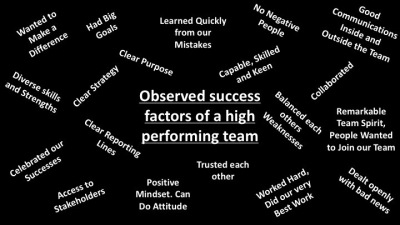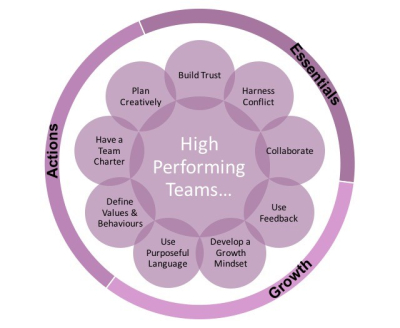High Performance Teams - fact or fantasy?

Do high-performance teams really exist? It seems that very few people I talk to about this topic have ever worked with one. However, those lucky ones that claim to have speak about it with joy. So, are high-performance teams fact or fantasy? Read on to find out more.
Let’s begin with a definition of high-performance teams. This term refers to teams, businesses, or groups that focus on their goals, achieve superior business results and outperform all other similar teams and expectations.
What do the experts say?
Well to kick off, a Global and Development Director (and a friend of mine) prefers to develop functional teams. She defines these in managerial terms such as ability and skills, clear roles, duties and reporting lines, deliver against a clear strategy and have good communication processes.
In this way, she affirms that for 20% effort she gets an 80% return. Whereas to reach for high performance in her business may only be required for less than 20% of teams. So, she then turns to experts (like me for example) to fulfill high-performance team development programmes when needed.
Leadership gurus and authors point us to learn softer skills to a achieve high performance. Patrick Lencioni, for example, holds that teams mature by working through their dysfunctions first.
Richard Barrett, uses a values-driven approach. He argues that teams need to move away from basic fear, survival, and ego-driven needs towards growth values such as to find meaning, make a difference and have a purpose.
Daniel Goleman, coined the phrase Emotional Intelligence as an effective way for teams to learn how to perform at their best.
Bob Chapman, CEO, and author believes that leaders can create workplaces in which everybody connected with that enterprise thrives and that everybody matters.
Carol Dweck, the author of Mindset says, ‘[high performance teams and] growth-minded leaders, start with a belief in human potential and development — both their own and other people’s. Instead of using the company as a vehicle for their greatness, they use it as an engine of growth—for themselves, the employees, and the company as a whole.’
On a practical note, in the past, I have been lucky enough to have lead what I (and others) deemed to be a high-performance team. I still look back on that time with joy.
These were the success factors that made us into a high-performance team:

For us, our high-performance team just seemed to happen, and years later, we all have fond memories of that time. However, on reflection, there were some important factors that had an influence. For example:
Furthermore, we had all benefited from first-class in-house soft skills programmes that matured us.
Today, in my development work with leaders, managers, and teams I have noticed that to build a great team is more than functional business processes, KPI’s and metrics. While they are of course vital for business effectiveness, they are not the be-all-and-end-all for high performance. (Note that few of those are present in the above success factors). I believe that great teams transcend these things. Even if individual team members are highly skilled or talented, that does not mean they will make an effective team together. Those are different skills.
So, how do you build high performance teams? What’s the secret?
To make a real difference, you have to work together to create an excellent high-performance team.
I argue that the success factors previously mentioned can be cloned and taught to any functional team.
It’s not about some extrinsic magic formula that you apply from the outside in, however. Nor is it about a team full of the cleverest people. You cannot become a high-performance team that way. It does mean you must have the right purpose, people, skills, input, direction, management processes and environment. Moreover, however, it is about people growth from the inside out. That means personal development around soft skills and emotional intelligence. It also means shedding a fixed mindset and instead encouraging a growth mindset (see my latest book below). However, ability and experience need to exist too (that’s a given).
The good news is it is possible to learn these types of intrinsic soft skills.
Don’t be mistaken; this is not a namby-pamby or fluffy process, however. Not at all! To develop people and teams from the inside out requires a willingness to mature and grow as individuals and as a team. That takes courage, time and some effort to nurture these.
To become a high-performance team needs dedication and willingness to take time out to develop. Moreover, to get there, you will need to:
The other benefit of high-performance teamwork means that you can then get on and run a successful business. Furthermore, you will not have to waste so much time on countless people issues.
A suggested approach
I have worked with teams at all levels for well over a decade now, and this model depicts how I help develop leaders and managers (or any functional team) to become a high-performance team:

(Andrew Jenkins, my latest book, Developing High Performance Teams)
First, it begins with the essential teamwork skills to learn how to build trust, harness conflict and to collaborate. When teams develop these skills, they start to contribute together to make an effective impact.
Second, as already mentioned, you will need to grow as individuals and as a team too. Feedback skills to call out each other are powerful change agents. In this way team members let go of potentially limiting behaviours and become accountable to each other. A positive frame of reference, a growth mindset and purposeful language are also crucial for high performance.
Third, agreed on team values, healthy habits, and behaviours create team spirit. A Team Charter, for instance, helps teams to commit to the fundamentals and reminds them how to collaborate effectively. Also, teams that plan together in creative ways to grow, provides purpose and direction to the business and is a critical leadership task. Besides, big goals keep teams motivated.
Use the Team Trust Review Assessment to help launch a step function improvement in the way your group works together.
Read this and more from Andrew Jenkins.
Identify your path to CFO success by taking our CFO Readiness Assessmentᵀᴹ.
Become a Member today and get 30% off on-demand courses and tools!
For the most up to date and relevant accounting, finance, treasury and leadership headlines all in one place subscribe to The Balanced Digest.
Follow us on Linkedin!
